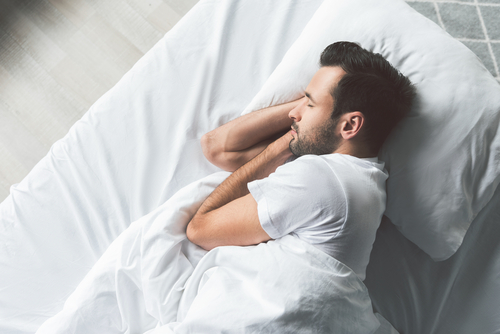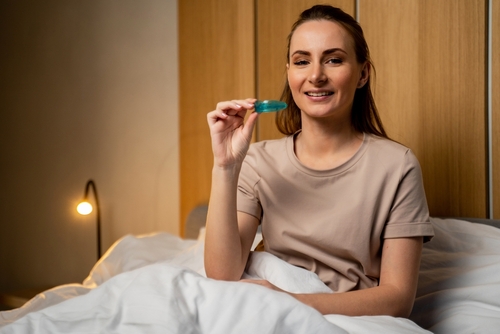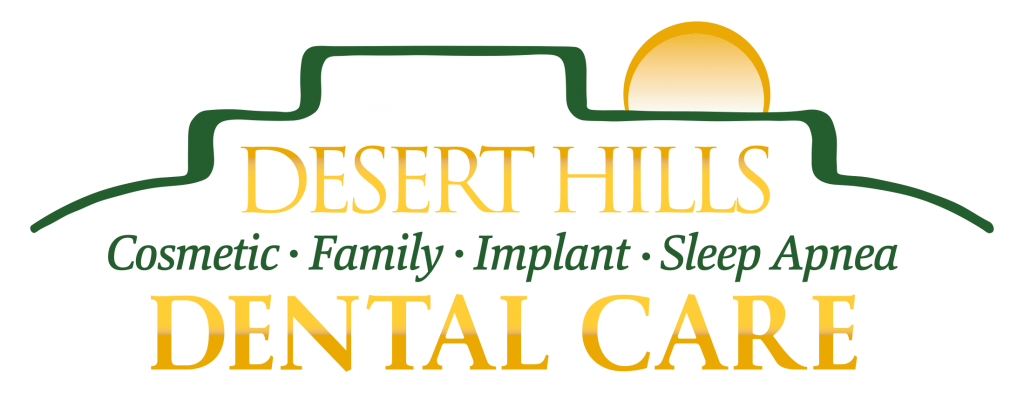Achieve a Peaceful Night’s Rest With Oral Appliances
Imagine a restful night’s sleep, where every breath you take is steady and uninterrupted. At Desert Hills Dental Care, we understand the significance of quality sleep for your overall well-being. If you or a loved one struggle with sleep apnea, you’ll be glad to know there’s a comfortable and effective solution available – oral appliances.
Our Farmington, NM sleep dentist, Dr. Charles Schumacher is dedicated to improving the sleep quality of New Mexico patients in Bloomfield, Aztec, Upper Fruitland, Farmington, and the surrounding areas.
What Are Oral Appliances?
Oral appliances, or mandibular advancement devices, are custom-made devices designed to alleviate sleep apnea and its disruptive symptoms. Obstructive sleep apnea is a common sleep disorder characterized by repetitive pauses in breathing during sleep, often accompanied by loud snoring and frequent awakenings. These appliances work by repositioning the lower jaw and tongue, keeping the airway open and preventing obstructions that lead to disrupted breathing.
Benefits of Oral Appliances 
- Improved Sleep Quality: Oral appliances promote uninterrupted breathing, leading to more restful sleep and reduced daytime fatigue.
- Non-Invasive: Unlike traditional CPAP machines, which involve wearing a mask, oral appliances are discreet, comfortable, and non-invasive.
- Enhanced Comfort: Custom-fitted to your mouth, these devices are comfortable to wear and do not hinder your ability to talk, drink, or sleep in various positions.
- Portability: Oral appliances are compact and portable, making them ideal for travel and use outside the home.
Who Is a Candidate?
Oral appliances are a suitable option for individuals with mild to moderate obstructive sleep apnea or those who cannot tolerate CPAP therapy. A thorough evaluation by your Farmington sleep specialist at Desert Hills Dental Care will determine if you’re a candidate for this treatment
How the Procedure Works
- Consultation: Your experienced Farmington sleep specialist will conduct a comprehensive evaluation, which may include a sleep study, to diagnose the severity of your sleep apnea.
- Customization: If deemed appropriate, a custom oral appliance will be designed based on impressions of your teeth and jaw.
- Fitting: Once the appliance is ready, you’ll be fitted with it. Our team will guide you on its proper usage and care.
- Follow-Up: Regular follow-up appointments at Desert Hills Dental Care will ensure the appliance is effectively addressing your sleep apnea and making any necessary adjustments.
Frequently Asked Questions
Can I still sleep in any position with the oral appliance?
Yes, one of the notable advantages of using an oral appliance for sleep apnea is you can sleep in any position comfortably. Unlike some other treatments, such as CPAP machines that require you to wear a mask and sleep in a specific position, oral appliances are designed to allow you the freedom to sleep in whatever position you find most natural. This flexibility ensures you can enjoy a restful night’s sleep without feeling restricted or uncomfortable due to the device.
Are oral appliances covered by insurance?
The coverage of oral appliances for sleep apnea by insurance can vary depending on your specific insurance plan and provider. Many insurance plans do provide coverage for oral appliances as a treatment option for sleep apnea, especially when they are considered medically necessary and prescribed by a qualified healthcare professional. However, it’s important to check with your insurance company to understand the details of your coverage, including any deductibles, co-pays, or documentation requirements.
Are there any side effects?
While oral appliances for sleep apnea are generally well-tolerated, there are potential mild and temporary side effects. These include minor jaw discomfort, increased salivation initially, minor tooth movement, potential dry mouth, and slight tongue tenderness. These side effects usually improve as your body adjusts to the appliance and are outweighed by the benefits of improved sleep and health.
How often do I need to clean my oral appliance?
Regular cleaning of your oral appliance is essential to maintain its hygiene and effectiveness. We recommend rinsing the appliance with water after each use and gently brushing it with a soft toothbrush and non-abrasive toothpaste at least once a day. Additionally, soak the appliance in a denture cleaning solution or a mixture of water and vinegar (1:1 ratio) for about 15-30 minutes a few times a week.
Start Your Journey to Better Sleep Today!
At Desert Hills Dental Care, we believe everyone deserves a good night’s sleep. Our commitment to your well-being extends to providing effective solutions like oral appliances for sleep apnea. Say goodbye to restless nights and embrace the comfort of uninterrupted breathing. Schedule a consultation with Dr. Schumacher by calling our Farmington, NM dental practice at (505) 427-2936 and learn more about how oral appliances can transform your sleep and enhance your quality of life. Your journey to better sleep starts here.
